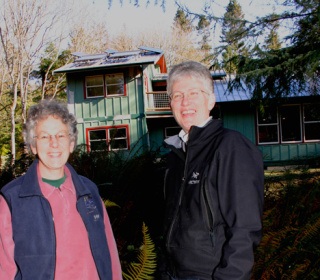When Nicole Luce shares her ideas about simple and sustainable island living, it’s with a spirit of adventure. She’s on a journey and she’s still learning.
Natural, non-toxic cleaners fill her utility closet. Red worms fill a bin in her yard, where they recycle kitchen scraps into rich, black compost for the garden. Low-energy fluorescent fixtures light her living spaces. Recirculating water, warmed by solar panels, heats her floors. Other panels feed electricity back to the Puget Sound Energy power grid, reducing her utility bill.
“Many people these days are remodeling or building, and want to do it smarter from an environmental standpoint,” said Luce, who shares her energy-efficient, earth-friendly, woodland home near Freeland with Janet Hall, coordinator of Washington State University’s (WSU) Waste Wise Volunteers.
“More and more people want to stop fighting nature and start working with it. We’ll talk about the countless ways we can do that,” she said. “That’s why I wanted to offer this class at Sound Waters University.”
Luce and Hall’s home incorporates lumber and other materials from their own property. A 1,200-gallon cistern gathers rainwater from their metal roofs for toilets and garden use. Solar panels warm water for radiant, in-floor heating. From their windows they watch birds and other wildlife traverse their land on natural corridors lovingly preserved for their use.
Where many homes might include a large lawn, they chose drought-tolerant native plants that require little watering and no fertilizers, chemicals or mowing.
Luce’s class, called “The Sustainable House: An Example,” is one of some
60 classes to be offered Saturday, Feb. 7, at the one-day Sound Waters University. The day-long community education event is held at Coupeville middle and high schools and is sponsored by WSU Beach Watchers of Island County.
Online registration is now open at http://beachwatchers.wsu.edu/soundwaters for any three classes, plus a keynote address by salmon researcher Dr. Mary Ruckelshaus of the National Oceanographic and Atmospheric Administration. Complete details are available on the Web site. Registration for the day is $35, plus
$8.50 for an optional box lunch.
Classes at Sound Waters run the gamut of island knowledge from shellfish safety to septic care, beaches and bluffs, archaeology, water and wells, shoreline creatures, orcas, birds, salmon, marine mammals, wildlife photography, bats, boating, kayaking, local fiber and food, tides and currents, fishing, rain gardens, native plants and mushroom hunting.
They are taught by educators, enthusiasts, government officials and hobbyists with one thing in common — a passion for their topic.
Three of this year’s classes will be discussions led by expert panels. Discussing the greening of Whidbey Island’s towns will be the mayors of Oak Harbor, Coupeville and Langley. Exploring the disappearance of salmon will be a panel led by Rebecca Ponzio of the Puget Sound Partnership. And discussing marine debris will be Melissa Montgomery and Lisa Kaufman of the Department of Natural Resources, and Simon Geerlofs of the Northwest Straits Commission.
Sound Waters typically attracts more than 500 attendees from Island County and beyond. Favorite classes fill fast, so students are encouraged to register early.


